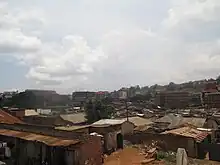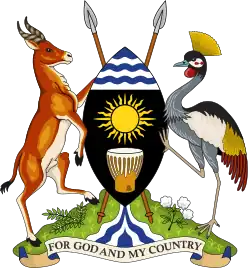Squatting in Uganda
Squatting in Uganda is the occupation of derelict buildings or unused land without the permission of the owner. The complicated history of land tenure has generated conflicts between squatters and owners.
.svg.png.webp)

Legality
In the Bugandan Kingdom (a Bantu kingdom within Uganda) as well as other areas, the 1900 Buganda Agreement assigned land to tribal leaders under the mailo system in which land is owned in perpetuity.[1] The 1995 Constitution of Uganda mandated four forms of land ownership, namely mailo, customary, freehold and leasehold.[2] Tenant rights were then boosted by the 1998 Land Act and its 2010 amendment.[3] The government sought to regulate squatting amongst other things with the 2010 Land Amendment Act and the 2018 Landlord and Tenant Bill.[1] People occupying publicly owned land are defined as squatters.[4]
History
The complicated history of land tenure has generated conflicts between squatters and owners.[3] Pastoralists such as the Bahima were driven off their traditional lands when the government created ranches and nature reserves, thus forcing them to become squatters. This had generated a crisis by 1990.[5]
In 2007, Makerere University in the capital Kampala began demolishing shacks in the Katanga slum.[6] People fleeing violence in the Democratic Republic of Congo entered western Uganda in 2012 and when the refugee camps became full, they began squatting. A local administrator was killed when he went to check on the squatters.[7] Violence broke out in 2014, when Bunyoro people evicted Congolese people squatting on their ancestral lands.[8] President Yoweri Museveni asked land owners to stop evicting squatters in 2018.[9] In 2019, a Wamala landlord was hacked to death.[1] Mining companies from countries such as Spain and China have been buying up land in Karamoja for mining and thus the people living on the lands have become squatters.[10]
References
- Lamwaka, Beatrice (19 January 2020). "Violence Between Landlords and Tenants Turns Deadly". Global Press Journal. Retrieved 8 May 2021.
- What the law says on evictions. Kampala: Ministry of Lands, Housing and Urban Development. 2017.
- Ali, Daniel; Duponchel, Marguerite (2018). Shortcomings to overlapping land rights and a way forward: the case of Mailo land in Central Uganda. World Bank.
- Place, F.; Otsuka, K. (August 2002). "Land Tenure Systems and Their Impacts on Agricultural Investments and Productivity in Uganda". Journal of Development Studies. 38 (6): 105–128. doi:10.1080/00220380412331322601. S2CID 153876472.
- Bazaara, Nyangabyaki (1994). "Land reforms and agrarian structure in Uganda: retrospect and prospect". Nomadic Peoples (34/35): 37–53. ISSN 0822-7942. JSTOR 43124071.
- Kiwawulo, Chris (19 March 2007). "Makerere razes Katanga buildings". New Vision. Archived from the original on 16 March 2015. Retrieved 11 May 2021.
- "Land row delays resettlement of Congolese refugees". The New Humanitarian (in French). IRIN. 7 March 2012. Retrieved 9 May 2021.
- Ongode, Beatrice (8 December 2014). "Uganda: Several injured & more than 70 houses burnt after violent land dispute in oil-rich region". Business & Human Rights Resource Centre (in French). Retrieved 8 May 2021.
- Limited, Mirror Digital (12 December 2018). "Stop Evicting Squatters — Museveni Warns Landlords". Uganda Mirror. Retrieved 8 May 2021.
- "Locals turned into squatters as mining firms take over Karamoja". Daily Monitor. 30 September 2019. Retrieved 11 May 2021.
.jpg.webp)
